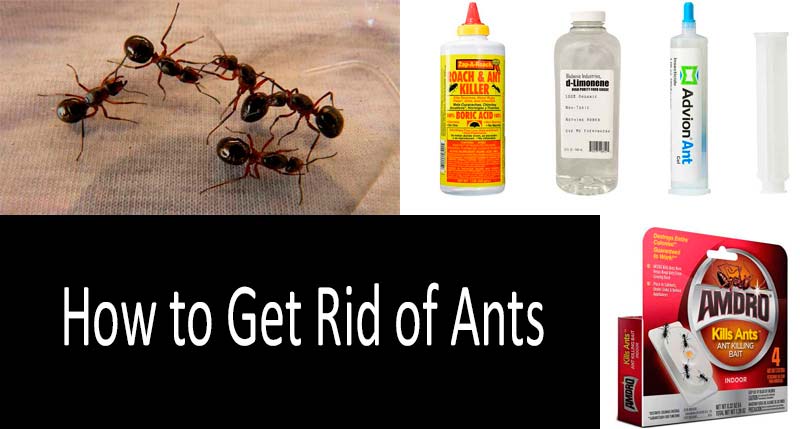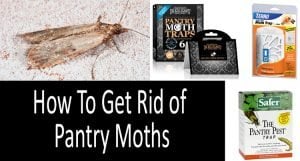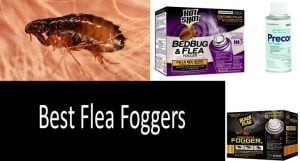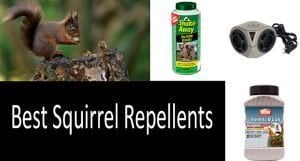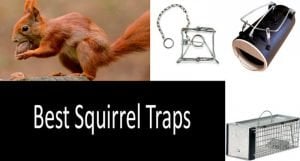The internet is full of pointless amateur advices like using duct tape or flour. Trying all of that against ants is in vain, you won’t get rid of these creatures so easily. We’ll bust all the myths and silly recommendations, and tell you in detail how to get rid of ants by referring to reliable sources and entomologists. Finally, we’ll find 17 ant control products for you.
Ants are one of the most common pests on household lots and adjacent territories. They crawl in the food, build ugly mounds, destroy wood and bite humans. As a rule, these bites only itch slightly but some species, such as red fire ants, have painful bites that are dangerous for highly sensitive people.
Table of contents:
All ants are very much alike; many people cannot distinguish between the different species although dozens of species can live near your house. The methods for getting rid of them may vary. To determine which species has infested your place, collect some working ants (without wings) into a test tube or another enclosed container to give to a specialist later.

Know Your Enemy: Everything You Need to Know to Get Rid of Ants
Ants are social insects, creating nests for their communities. Several hundred to several million individuals can live in a single colony. These insects are known for being polymorphic, i.e. individuals’ appearance within a particular species can vary according to their functions: the queen gives offspring and the workers produce food and build a nest. Some species have special soldiers for protection.
Although a nest doesn’t take up much area, ants can travel long distances in search of food and construction materials. They find their way home using a specific smell and form stable trails. Food and construction material are collected by foragers. At the time of mating, a large number of winged ants appear in the colony. They leave their colony and fly away in search of new territory for settling, and sometimes they happen to fly into houses. Fortunately, pests that are adapted to living in the open air rarely create indoor nests.
Ants are omnivorous. They feed on plants’ nectar and sweet fruit, and some species attack other insects or worms. They can co-operate with aphids, mealybugs and other garden pests: they graze aphids and ensure their safety to receive in return the sweet delicious pod that they feast on.
Ants’ taste is a separate subject. They turn out to be gourmets, and many people don’t understand why some baits work perfectly well, while in other cases, insects ignore those baits completely. “Ants are rather finicky in their food preferences and may alter them throughout the year”, – as the University of Kentucky entomologists claim. “If one bait product isn’t attractive or doesn’t seem to be working, try another. Optimal results usually require a sustained period of feeding, not just a brief visitation by a few ants.”

Scientific Methods for Getting Rid of Ants
The worst mistake you can make when getting rid of ants is to only eliminate the insects you can see on the surface, I.e. foragers. Most of the colony hides underground together with the queen. Killing her is the key to destroying the entire colony.
Various web-sites and blogs recommend sprinkling the places where insects enter your house with flour or talcum and using duct tape, salt and ground pepper and other household treatments against them. Some methods can repel ants from your picnicking spot for a little while, but other than that they are useless. Their advanced social structure will help them find their way quickly and collectively.
The scientists from the University of California don’t consider complete destruction of ants possible or feasible as they serve a sanitary purpose. Your key aim is to isolate them from your home, sources of food and water, valuable plants and any places where they can do harm to your household. Effective control is achieved using several methods: mechanical, sanitary, and chemical ones.
Sanitation
If you notice these insects in time, you will be able to prevent them from settling. Check your house and its surroundings regularly. Ants tend to appear near water sources, in kitchens, in bathrooms, as well as in places with lots of furniture and fabric, for example, in cabinets and bedrooms. They can be found in closets, under the sink, along the water pipe, sewage and wiring. Foraging ants may appear in your house as well. In that case, you are lucky. Ant tracks mean that your house has become a source of fodder. These trails will help you determine the insects’ entrance into the house and find the nest.
Seal the cracks and holes in the foundation, walls and communication entry points as ants often move along the pipes. Add some silicon dioxide (silica) to the filling solution. Professional products combine silica with pyrethrins.
To make your house no longer attractive for the insects, clean up and remove any food debris (including pet food) from the outer walls of containers and Tupperware, remove spilled sugar, throw out the trash and mulch piled near your house and keep overall cleanliness. Don’t plant nectarous trees and flowers near the house.

Ants can also nest in pot plants. Don’t forget to look for the insects there and if you find any, place the pot in a solution of insecticidal soap (2 tablespoons) and water (1 quart or a liter) for 20 minutes. Wrap Velcro around the tree trunk to protect young trees. Near them install traps with bait distracting the insects from plants.
Baits
Baits containing insecticides are available in liquid, solid form or in drops and take some time to act (up to several weeks). How do they act? Foragers lead other insects to these baits and the latter will bring poisoned food to the nest. Eventually, the bait will reach the queen. The University of California experts consider bait more effective than sprays as the former contains hydramethylnon, fipronil, boric acid or avermectin. It is best to apply it in early spring and change the bait type during the year as the insects change their preferences each season.
NB! «Place the baits next to wherever ants are seen, preferably beside ant “trails” (invisible odor trails which worker ants follow between food and the nest). Do not spray other insecticides or cleaning agents around the bait stations as this will deter ants from feeding on the bait. Initially, you should see an increase in the number of ants around the bait station – DO NOT SPRAY THEM. This indicates that the ants are feeding on the bait and transporting the insecticide back to the nest. Ant activity often will subside in a matter of days as the number of ants in the colony declines. Then you should continue to place additional baits wherever ants are seen. », as recommended by the University of Kentucky.
Insecticide Spraying
The University of Kentucky specialists advise: «When a below-ground nest is discovered, the colony can often be eliminated by spraying or drenching the nest location with a liquid insecticide such as carbaryl (Sevin), or a pyrethroid insecticide such as Spectracide Triazicide®, Ortho Home Defense System®, or Bayer Advanced® Lawn & Garden Multi-Insect Killer. Large colonies will require greater amounts of liquid to move the insecticide throughout the network of underground galleries within the nest (using a bucket to apply the diluted insecticide concentrate is an effective method). Another effective and convenient way to control some species of outdoor and indoor-nesting ants is with a granular bait product, such as Combat® Ant Killing Granules. Sprinkle the bait in small amounts beside outdoor ant mounds, along pavement cracks, and other areas where ants are nesting or trailing».

How to Get Rid of Ants Indoors and Outdoors
You’d better use various gel baits, bait stations and powders indoors and apply liquid concentrated insecticides, granules and certain gel baits outside. Below, we’ll explain this in detail.
- Indoor Control
Having ants at home doesn’t always mean that the colony is located outside, in the soil. There are many spots for a potential nest inside a building: inside the walls, in a closet or household appliances, between window frames and under the floor. These places are difficult to reach and that’s when the bait comes in handy and removes ant feeders and other pests that taste the poisoned bait brought by feeders. The advantages of the baits, therefore, are their simplicity for home use and quick result.
Remember! Using bait at home can attract insects from the outside. Also, replace any unpopular bait with another one that has a different active ingredient.
Various diatomaceous earth, boric acid or deltamethrin-based dusts are also suitable for home use. They act as contact and stomach insecticides killing the insects on which they’ve been applied by dehydration. While deltamethrin-based dusts can be used outdoors because their active ingredient is water-resistant, such organic substances as diatomaceous earth and boric acid will kill insects only when it’s slightly humid. They can also be used outside if you treat the mound and trails with it but as the soil will hardly be always dry, the effect will be inferior and the spending of the substance will in turn increase.
Moreover, the list of synthetic chemical active ingredients of insecticides allowed for home use is shorter than that for outdoor use. In addition to the above mentioned substances, use permethrin, fipronil, indoxacarb and hydramethylnon-based baits and powders at home as their effectiveness is confirmed by scientists.
- Outdoor Control
If ants have infested your garden, your main task is to find the source of the danger, i.e. the mound. Once you find it, it’s best to treat the area with some powerful liquid insecticides and granules. Liquid concentrates kill the insects both inside the mound and in the areas of activity around it and granules serve as a “safety cushion”, also killing any insects throughout the rest of your lot. Granules prevent new colonies from emerging for up to 6 months.

Certain liquid insecticides, for instance, permethrin and bifenthrin-based are also permitted for indoor use despite being initially aimed at outdoor use for soil and mound treatment. You can also treat your house’s foundation by spraying one of the liquid insecticides around the outside perimeter of the building.
Outside, you can also use some special slow-acting gel baits described below.
Getting Rid of Ants: 17 Best Indoor and Outdoor Products
We’ve decided to describe 17 different ant control products. For your convenience, they have been classified into five categories:
- Ant bait stations and gel
- Non-toxic, natural insecticides
- Powerful liquids – pyrethroids
- Professional insecticides
- Essential oils for those who value 100% organic products
Ant Baits Stations and Gel
We’ve picked six different treatments for home and outdoor use. Note that there is no universal bait for all kinds of ants because, as you remember, their tastes differ and that’s why the product might not be effective immediately.
There are fast and slow acting baits. The former type acts within 3-7 days and the latter acts within 1-5 weeks. Slow acting baits, including IGR, are considered more effective as there is enough time for everyone including the queen to get poisoned. Their active ingredients are hydramethylnon and spinosad. Fast-acting baits are perfect for those who want to achieve quick results despite possible repeat treatments.
Indoor
Advion Ant Gel Insecticide with Plunger
This is a bestselling insect bait. A gel tube just over an ounce (30 ml) (4-pack) and can serve you for up to two years (this is the expiration date declared by the manufacturer). It is aimed at getting rid of most ant species indoors which is attested by high ratings of users (80% is the highest rating). In order for the bait to work, squeeze a small amount of it on a crack near the nest or any other place out of pets’ and children’s reach.
Price: Check the current price
Combat Source Kill Max A1 Ant Bait, 6 Count
The baits acts according to the domino principle described above. The poison doesn’t kill an insect instantly and lets it interact with other ants and contaminate them. The bait is also useful against cockroaches. A solid substance located inside the station is not to be removed as it is toxic for skin and mucous membranes. Store it out of children’s reach. Simultaneously, the bait doesn’t emit any toxic fumes and is harmless if used correctly.
Price: Check the current price
AMDRO Kills Ants Bait Stations
So far, this brand is not very popular but it offers a slow-acting stomach poison Hydramethylnon that disrupts the ant’s ability to convert food to energy. It will take 1-2 weeks to kill the entire colony along with the queen. The pack includes four bait stations for indoor use. This treatment is active for three months, after which the stations require replacement. The nice perk is that the manufacturer promises a refund if the product proves useless.
Price: Check the current price
Combat Max, Ant Killing Gel
Advion Gel’s rival is cheaper. To use, squeeze this gel out of the syringe on any place reachable for the ants. It acts within an hour and you will see preliminary results within 3-5 days. The manufacturer notes that this fipronil-containing product is safe for kids.
Price: Check the current price
Outdoor
Terro 1806 Outdoor Liquid Ant Baits
A pack of 6 stations, each containing an ounce of bait. The stations are installed either in the soil or on the surface (you can also place them in your garage). The action is similar to that of most types of bait: a worker is contaminated with a poison that is passed on to other individuals including the queen. The product has lots of positive reviews.
The second form of the treatment available is stakes. A pack contains 8 small stakes containing 0.25 of an ounce of bait each and costs: Check current price.
Combat Ant Killing Bait Strips
They are placed in places difficult to reach and also act according to the domino principle. They are invisible and because they are numerous, can poison a large territory. Although the buyers leave decent reviews, the product isn’t very popular.
Price: Check the current price
Non-Toxic Natural Insecticides
Certain plant-based oils (e.g., peppermint, rosemary, clove, orange, and thyme) are formulated in pesticide-type products, and the University of California scientists approve of using the above mentioned essential oils. They name boric acid, limonene, eugenol and Diatomaceous Earth among effective organic treatments.
Safer Brand 51703 Diatomaceous Earth Bed Bug, Flea and Ant Crawling Insect Killer
Diatomaceous Earth is a classic and most popular organic treatment against insects and arachnids. The fossil remains of diatom algae are crushed to a state where they become acute and harmful to insects. The sharp edges of this so-called mountain flour cut through the chitinous cover of an insect and cause deadly damage to its insides. Diatomaceous Earth is safe for humans and animals, since it cannot penetrate elastic skin. It is sold in packages of 4 pounds. Sprinkle the places of congestion and possible migration of ants into the house with it.
Price: Check the current price
PestGuard Zap-A-Roach Boric Acid
Two 16-oz boric acid tubes. This is a traditional means of controlling the insects. Boric acid is a stomach poison that causes insects to die from starvation. This acid has long been used in various aspects of household life, for instance as an antiseptic in medicine. Over time, the remedy was replaced by stronger antiseptics, and boric acid was still used when getting rid of ants.
The acid is sold as a powder for sprinkling the cracks, areas behind skirting boards and other hard-to-reach places where insects live. It cannot kill the queen without human interference but it still has quite a high rating.
Price: Check the current price
Blubonic Industries 100% Orange Oil d-Limonene
 The bottle contains 16 oz of d-Limonene. It is hydrocarbon which essential oils of citrus contain and which gives them the typical smell. It used in perfumery, alternative medicine and when getting rid of any insects. Remember that d-Limonene is not found separately in nature and gives off a very strong smell of orange, so it is used diluted (like in the Orange Guard 103 Water Based Indoor/Outdoor Home Pest Control). It contains only 5% of d-Limonene and is specifically aimed at eliminating home insects that are afraid of the citrus smell. The spray costs: Check current price
The bottle contains 16 oz of d-Limonene. It is hydrocarbon which essential oils of citrus contain and which gives them the typical smell. It used in perfumery, alternative medicine and when getting rid of any insects. Remember that d-Limonene is not found separately in nature and gives off a very strong smell of orange, so it is used diluted (like in the Orange Guard 103 Water Based Indoor/Outdoor Home Pest Control). It contains only 5% of d-Limonene and is specifically aimed at eliminating home insects that are afraid of the citrus smell. The spray costs: Check current price
Natural Sprays
Eco Defense Organic Home Pest Control Spray
This product’s label reads eco. It contains such active ingredients as sodium lauryl sulfate, geranium oil, and peppermint oil. Though the University of California approves of using peppermint oil, the effectiveness of the overall mixture has not been proven and can only be estimated by decent user feedback. 16 oz of the spray is available for Check the current price
Ecosmart 33119 Organic Home Pest Control
This is yet another organic product based on carnation and peppermint oils. It can be used against 100 insect species, including ants. The manufacturer specifies that the product is safe for kids and pets and does not contaminate home surfaces. The customers didn’t rate the product highly as a quarter of the reviews are negative.
Price: Check the current price
Powerful Liquid Pyrethroid-Containing Insecticides
Ortho Home Defense MAX Insect Killer for Indoor & Perimeter RTU Wand
This is a powerful pesticide with bifenthrin as an active ingredient. It is supplied in a 1.1-gallon canister. It is sprayed over a dry surface where no moist cleaning is permitted within a day. It kills the insects and creates long-term protection (for up to year indoors and for up to three months outdoors). A spray is supplied with the canister.
Price: Check the current price
Spectracide HG-95830 Triazicide Insect Killer for Lawns & Landscapes Concentrate
This ready-to-use spray a concentrate is also available. It acts on many insect species and their larvae as well as on arachnids and ticks. It kills ants as well, but judging by the information, it is ineffective against red fire ants. The product is for outdoor use only.
Price: Check the current price
Professional Products Sold Online
Compare-N-Save
This spray contains a powerful pyrethroid bifenthrin. It is used against ants, beetles, bugs and other insects. It is sold as a concentrate. Mix it with water before use. The product will act for up to three months provided it is properly used on dry surfaces both indoors and outdoors.
Caution! Don’t use this insecticide near bodies of water as it is toxic for aquatic plants and animals. When spraying it, wear protective gloves and avoid contact with skin and mucous membranes. Once the treated surfaces dry, they are safe for children and pets.
Price: Check the current price
Suspend Sc Insecticide
A pint of the product containing 4.75% deltamethrin. The insecticide is to be dissolved in loads of water (up to 64 gallons), so you’ll spray a large area with it. It can be used both inside and outside. The product is odorless and highly rated by the customers.
Price: Check the current price
100% Essential Oils
Many love the idea of everything being natural. The main disadvantage of oils is their lack of contact with the queen. Since killing the queen is crucial for getting rid of the entire colony, natural treatments, alas, are powerless here. That is why you’d better resort to using baits if a large colony has infested your house.
Ceylon Cinnamon Leaf Oil
Ceylon cinnamon leaf oil is sold in 2 oz jars and contains pure 75% eugenol. The product is used against bacteria and fungi but it can also repel ants. To achieve positive results, dilute 1% of oil in 99% of water and use a soaked cotton swab to draw a line along the perimeter of your house or lot.
Price: Check the current price
Clove Essential Oil
Clove essential oil isn’t an insecticide but can be used as an insect repellent. For that, just like cinnamon leaf oil, it should be dissolved in plenty of water. More often, it is used as an anti-stress element in aroma therapy.
Caution! Concentrated essential oils are dangerous for pets, especially cats, pregnant women and small children.
Price: Check the current price
17 Ant Control Products Comparison Chart
If a specific type of ant bothers you, refer to our guides:
- How to get rid of ants in the house
- How to get rid of black ants
- How to get rid of flying ants
- How to get rid of fire ants
- How to get rid of ant hills
Ant Bites
Conventional forest red and black domestic ants are not dangerous for humans. The power of their bites is comparable to mosquito bites. Dangerous species live in the tropics and subtropics of all continents.
Red fire ants are also widely spread; they live in South America and the southern United States, Taiwan, Australia and New Zealand, the Philippines and China. Their bite can cause allergic reactions, including death from anaphylactic shock (but these cases are rare). Myrmecia also live in Australia, bullet-ants inhabit South Africa, and South America is infested with army ants. All these species are dangerous if the bites are multiple, and sometimes even single bites can cause allergies.

The spot of the bite usually swells and reddens, and a rash may appear. Sensitive people may experience an acute allergic reaction of angioedema (swelling of the face or extremities) and urticaria. In this case, you must call the ambulance. While it is on its way, protect the victim from further bites, apply a pressure bandage above the bite wound or apply a cold compress on the wound, ensure a flow of fresh air, calm the victim down and give them a few activated carbon pills.
{code 416}
{code 94}

